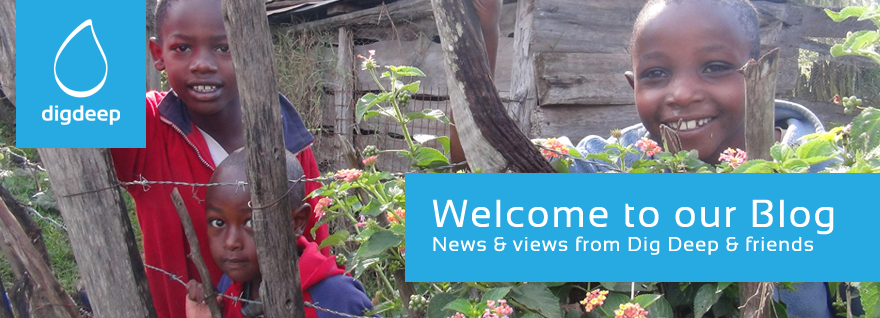 |
| Tina battling the midday sun at Monsonik School, Ndanai |
 |
| Celebrations at St Theresa's School for the Water, toilet and hygiene promotion programmes opened this month. |
On the projects front we have undertaken in the last 7 months more projects than we have completed in the last 7 years. The scale is breathtaking. The impact huge. We visited no less than 5 opening ceremonies and visited around 20 schools that will soon benefit from our WASH programme. WASH stands for Water, Sanitation and Hygiene. The interrelatedness and symbiotic relationship between these three things has long been established in research.
 |
| Rain water harvesting taps at St Therasa's |
Clean drinking water reduces disease in the form of diarrhoea by around 20%, having hygienic toilets reduces that further by 35% and education about handwashing reduces it by a further 35%. The approach we are taking has compound benefits. The communities around Ndanai are taking the steps that are needed to bring about change by sending their teachers to learn how to train children, by selecting the contractors to build their projects and by stocking up on the soap and materials that are needed to sustain those improvements. By assisting us to support the community you have removed some fundamental barriers for these communities to receive the education and increase the opportunities to live healthy lives that will ultimately enable development from within.
 |
| Directing the thanks to Field Officer Justus, who has been co-ordinating the programme in the Ndanai Region. |
On my last trip we left a copy of our Impact Report with several communities. It was clear they had done the rounds and we were delighted as we feel its important that what we write about these distant places is read by those featured. One thing repeatedly mentioned was our student Kilimanjaro climbers. The legend of Kilimanjaro extends throughout Africa, even to villagers who have never left their county. That people would donate to charity because an individual was undertaking such a challenging and often unpleasant adventure is not quite understood. When you think about sponsorship it is quite an odd abstract idea! One headmaster pulled me to one side and said if it were his son or daughter he would pay for them NOT to have to do it.
After a fumbled attempt or two to explain we eventually nailed it. In the UK, we explained, when you are passionate about a cause you make a sacrifice to your friends and family to show them how dedicated you are to making a difference. Promising to climb Kilimanjaro is a physical, and mental, sacrifice. The cultural chasm conquered and with much chatter the communities extended their thanks and prayer for all of the students and climbers.
 |
| Members from the Kingston and Leicester group climbing Kilimanjaro |
This method of fundraising attracts some unwarranted criticism from some parts. Only we and our fundraisers know that half the sacrifice is spent throughout the year organising and orchestrating the fundraising. It requires new skills to be learnt, dedication and produces a legacy of experience that will hopefully stand the future of philanthropy in great stead. On behalf of Dig Deep we simply cannot thank you guys enough.
It is such a privilege to visit our projects and to receive the heartfelt thanks of the communities. Really though the thanks is for everyone that has donated and for all of those community members who are standing up for themselves and making these improvements on behalf of the people they share their lives with. Standby everyone for more project updates and videos than ever before. And on that note I need to get back to categorising all that material!








